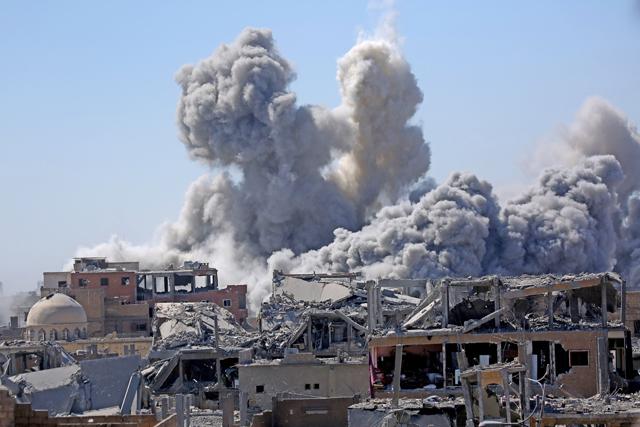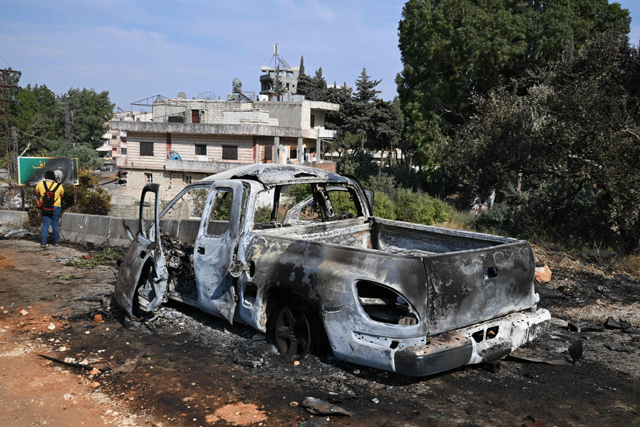You are here
Israel hits Syria site reportedly used for chemical weapons
By AFP - Sep 07,2017 - Last updated at Sep 07,2017

Smoke billows in the embattled northern Syrian city of Raqqa on Sunday, as Syrian Democratic Forces, a US backed Kurdish-Arab alliance, battle to retake the city from the Daesh group (AFP photo)
DAMASCUS — Syria's army accused Israeli warplanes of hitting one of its positions Thursday, killing two people in an attack that a monitor said targeted a site where the regime allegedly produces chemical weapons.
The site near the Syrian town of Masyaf, between the central city of Hama and a port used by the Russian navy, is reportedly used by forces from Syria's allies Iran and the Lebanese Shiite militia Hizbollah.
Israel has previously carried out strikes believed to be targeting the transfer of weapons to Hizbollah, which fought a devastating war with the Jewish state in 2006.
Thursday's strike hit a training camp and a branch of the Scientific Studies and Research Centre (SSRC), an institution that Washington has accused of helping develop the sarin gas used in a deadly attack on the Syrian town of Khan Sheikhoun in April.
President Bashar Assad's government has blasted such accusations as "fabrications", and Syria's army on Thursday did not mention the SSRC in its statement on the Israeli strikes.
"Israeli warplanes at 2:42am today fired a number of missiles from Lebanese airspace, targeting one of our military positions near Masyaf, which led to material damage and the deaths of two members of the site," the statement said.
"Syria's army warns of the serious repercussions of such acts of aggression on the security and stability of the region," it added.
The Britain-based Syrian Observatory for Human Rights monitoring group also said the strikes hit the SSRC, though it could not confirm what weaponry is produced there.
“There are Iranian experts using the research centre there. Hizbollah also uses the facility,” said observatory head Rami Abdel Rahman.
“The research centre was definitely damaged in the strikes. There is a huge fire emanating from a weapons warehouse where missiles were being stored,” he added.
‘Produces chemical weapons’
Israel has long warned it would not allow the transfer of sophisticated weaponry to Hizbollah and has accused the group’s sponsor Iran of building sites to produce “precision-guided missiles” in both Syria and Lebanon.
“Iran is busy turning Syria into a base of military entrenchment,” Israeli Prime Minister Benjamin Netanyahu said last month.
Israeli officials declined to comment on the raids on Thursday.
Former military intelligence head Amos Yadlin said the site “produces the chemical weapons and barrel bombs that have killed thousands of Syrian civilians”.
He stopped short of saying Israel had carried out the raids, but said that if it did, the action would show “Israel intends to enforce its redlines despite the fact that the great powers are ignoring them”.
And Israel’s former national security adviser Yaakov Amidror described the facility as a key centre for the research and development of arms including chemical weapons.
“It is the first time that the target which was attacked is a formal Syrian facility, not just a warehouse but a centre of R&D and... responsible for producing the chemical weapons in the past and many other weapons systems,” he told journalists.
“We will not allow Iran and Hizbollah to build the capabilities which allow them to attack Israel from Syria,” he added.
“And we will not allow them to build the capabilities of Hizbollah under the chaotic umbrella of Syria.”
He said there should be an “assumption” that Syria would respond militarily.
Earlier this week, Israel’s military began a massive exercise simulating conflict with Hizbollah, the largest drill in nearly two decades.
Hizbollah is a key ally of Assad’s regime, and its fighters battle alongside the Syrian army.
Hizbollah chief Hassan Nasrallah, who lives in hiding, made a rare visit to Damascus for talks last month.
Syria’s government claims it no longer possesses chemical weapons after a 2013 agreement under which it pledged to surrender its chemical arsenal, following a chemical weapons attack outside the capital.
But in 2016, a UN-led investigative body said the Syrian government was behind at least three chemical attacks in northern Syria in the previous two years.
And on Wednesday, United Nations war crimes investigators announced they had an “extensive body of information” indicating Syrian warplanes were behind the deadly April 4 attack on Khan Sheikhun.
A fact-finding mission by the UN’s chemical watchdog, the Organisation for the Prohibition of Chemical Weapons, concluded earlier this year that sarin gas was used in the attack but did not assign blame.
The attack killed at least 87 people and prompted the United States to launch a cruise missile strike on a Syrian military airport where it said the attack had originated.
Weeks later, the US sanctioned 271 Syrian chemists and other officials affiliated with the SSRC, which it said was behind the Syrian government’s efforts to develop chemical weapons.
Related Articles
MASYAF, Syria — Near the usually quiet Syrian town of Masyaf smoke was still billowing from trees while burnt-out cars stood nearby, a day a
BEIRUT — Israeli missile strikes on Syria killed at least six Iran-backed fighters on Friday, a war monitor said.The dead were all foreign p
BEIRUT — Companies and nationals blacklisted by France for alleged links to Syria's chemical weapons programme denied any wrongdoing on Thur












